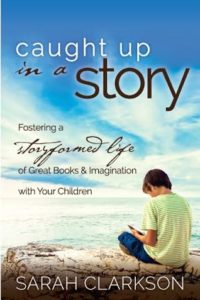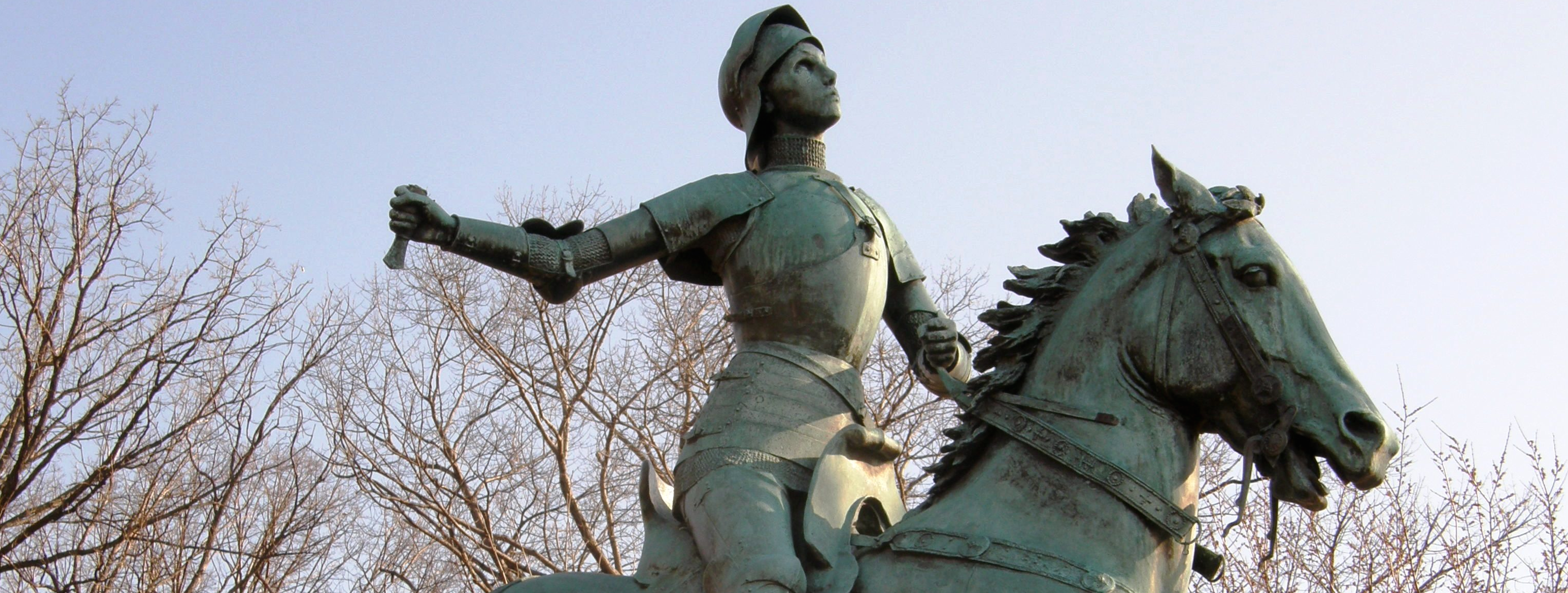 Editor’s Note: This is an excerpt from the intro to Caught Up in a Story, Sarah Clarkson’s book which releases tomorrow! Get that. –Sam
Editor’s Note: This is an excerpt from the intro to Caught Up in a Story, Sarah Clarkson’s book which releases tomorrow! Get that. –Sam
—– —– —–
“What hero are you going to be?” my brother asked, as if the world depended on my answer. He was golden then, hair like sunlight, eyes blue as a young summer morning. I was his dark-haired sister. Twelve good years thrummed in his steps, and fifteen in mine as we strode down the gypsy ribbon of a country road, laughing in the face of a fast-setting sun and swiftly rising storm. The crackle and crisp of dying leaves was in every gust of wind; the oaks and ash and maples danced darkly overhead in crimson, flaming grace.
“A princess, of course; a brave one like Eowyn,” I answered, “with sword at the ready.”
“And a bow and arrow too?” he queried.
“Oh yes,” said I.
He smiled in a fatherly way, “Good. Princesses should only sword fight if they absolutely have to.”
He slipped his arm through mine then. I took it and grinned a knowing look to the sere meadows at the darling presumptions and gallantries of my little brother. He was still short then; I stood a good head taller, curbing my strides to match his. The softness of childhood still rounded his face and in moments like those, just us two in a wind-tumbled world, dreams looked out unmarred from his eyes.
“I’m going to fight the orcs like Aragorn and Legolas; I’m going to defeat enemies and fight the darkness,” he chattered, “Do you want to hear the story I’m writing? It’s about an enchanted sword …”
We walked that day with the loping ease of young idealists. There was magic in the air, a scented wind with a heady mix of autumn’s death and brightness that worked like a truth potion on the both of us; we thoughtlessly told the dreams we usually hoarded in silence. Our secrets? Stories. The stories we loved in books, the favorite tales that captured our vision and challenged our dreams. But also the stories we told about ourselves, the narratives we formed in imagination of who we might become and what we might accomplish. Those were the far more telling secrets and we marveled to hear ourselves voice our hopes to accomplish brave deeds, to tell great stories, to live as heroes in the tale of our time.
As we strode that autumn road we recalled the tales that had formed our dreams and we examined their respective heroes; Lucy in Narnia or Aragorn in Middle Earth, Martin the Warrior of Redwall, or even Freckles, the courageous guard of the Limberlost. If they could fight and love, defeat darkness, make beauty, why not us? With each pound of step we imagined the future, each pulse of blood brought our dreams of bravery into speech. Everything seemed possible then and it filled us with a breathless laughter. When we reached the bend in the road, pausing an instant before we turned, I asked him back: “What hero will you be?”
“Superman.”
The name made my lips twitch but I didn’t smile, for suddenly, there was no laughter in his voice. I glanced sideways and slightly down, curious, and found him staring hard into the coming dark. Brightness was in his eyes, like light pooled in water just at dusk. He walked faster. His chin went up. His arm was restless in mine and abruptly I knew that he meant it. With every ounce of his soul, he intended to be the utmost of real life heroes and he was walking ahead as if to meet the man he would become.
Perhaps that set chin was daring me to laugh, to parry back and slough off his solemnity with a pinch of scorn. I didn’t. I turned my face back to the snake of road fleeing out from under our feet and kept silence. Imagination is the first step to creation, the instigating spark that drives the actions of a hero. As I stood on the cusp of adulthood that day, I understood the truth at the base of the dreams that my brother and I had shared. If we could imagine great stories, there was the chance, the hope, that we could live them too. The flush-faced thrill of our walk came from the tales we hoped to live; fancies begun in childhood, now ripening into ideals and declared to each other for the first time. There was a sort of doom upon us both now. We had dared to say what heroes we would be, and somehow, from that dappled minute and those spilled stories, there was no turning back.
Almost fifteen years have passed between our words on that memorable day and the moment in which I set them forth on this page. Nate and I are both adults now, and you might assume that the difficult realities of adulthood—the work and compromise and practicality needed for life in a modern world—might have dulled the edge of our ideals. Successful citizens, productive adults, contributing members to family or society, you might think those reasonable goals would replace our youthful, wild-eyed hunger for heroism.
But oh, if you do, then I think you’ve never been wholly captured by an epic tale. You’ve never tasted the beauty of an otherworld so great it sets your soul alive with longing and your mind to wondering if you could make such beauty yourself. You must never have witnessed great battles in imagination and hoped that you could stand your ground in a battle of your own. You’ve never had the doughty heroes and gracious heroines you loved in countless childhood tales standing guard in your mind, staring you down with a challenge to act as bravely, to give as fully, to hope as ardently in your own story as they did in theirs. Adults though we are, adults who work and love, struggle and hope through our confusing twenty-something lives, Nate and I, and Joel and Joy (my other siblings), still believe that we are called to be heroes and heroines in the story of the world.
Why? Because we are storyformed souls.
We were children whose concept of self was formed by the stories my parents surrounded us with from birth. We heard the story of Scripture first, and we met it as an epic narrative, the great true tale of the world that began with an artist God brooding over the formless earth and will end with the wedding of a King and a feast marvelous beyond all imagining. Every morning we woke to hear the stories of biblical heroes over breakfast, to speak of them throughout the day. We met David and Daniel, Ruth and Esther and Mary as companions and friends in a mighty quest. They invited us to the adventure of God’s kingdom invading the world, and from infancy we were taught to embrace that great story as our own.
Then we had books. Countless books. A library crammed with stories old and new, baskets of picture books by the bed, and stacks of art books under the coffee table. We were children who went to bed with Narnian heroes in our dreams, woke to picture books before breakfast, and biographies assigned for the afternoon. We had imaginations crammed with the beauty of story, of landscapes, characters, and quests constantly expanding our concept of what was good, and beautiful, and possible. Every book we read, every new world encountered came with my parent’s challenge for us to dream of who we might become, who we might help or save, and what we might create.
“You are part of God’s story on earth,” my parents whispered in our ears, “You can be like Aragorn or Frodo or Sam in the battles of the world, you can bring beauty like Jared (in The Journeyman by Elizabeth Yates), or discover something new like George Washington Carver. What kind of hero do you want to be?”
I have written my book, Caught Up in a Story, because I believe that every child should grow up to ask that question and I think that great stories lead them to it. Stories challenge us to see our lives as the narrative in which we have the chance to live all the beauty and bravery we can imagine. What hero will I become? What great thing have I been created to accomplish? I believe those questions of heroism are the driving force behind a life of virtue, creativity, and purpose. The great historical leaders, artists, teachers, inventors, and even martyrs, lived in fidelity to a cause larger than themselves. Search deeply enough into the history of any real life hero and I am convinced that you will find a story, imagined or actual, on which that hero’s life is largely based, a narrative that opened their eyes to the part they were called to play in the story of the world.
Great stories teach us that we are called to live a great life story.
—– —–
Editor: Go here to order Sarah’s new book.
—– —–
- Book Review: Brambly Hedge - January 10, 2018
- Book Review: Brambly Hedge - January 18, 2017
- Brambly Hedge - August 31, 2016

Leave a Reply